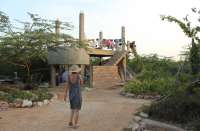Curricula vitae
Elective ethnic studies programs throughout the state of Arizona have been under intense scrutiny since 2010, when Governor Jan Brewer signed HB 2281 into law, forbidding public or charter schools from offering at any grade level courses that: “promote the overthrow of the United States government, promote resentment toward a race or class of people, are designed primarily for pupils of a particular ethnic group, or advocate ethnic solidarity instead of the treatment of pupils as individuals.”
In 2012, the interpretation of these regulations led the Tucson Unified School District (TUSD) to dismantle the Mexican-American studies program specifically on the grounds that the curriculum promoted "resentment toward a race or class of people" and advocated "ethnic solidarity instead of the treatment of pupils as individuals." The 14-year-old Mexican American studies program offered courses from elementary school through high school in topics such as literature, history, and social justice, with an emphasis on Latino authors and history.
Nearly half the seats in Arizona's public and charter school classrooms are occupied by Hispanic students, but the implementation of HB 2281 has made it illegal for teachers to use a curriculum that teaches these students and their peers about Hispanic heritage, as this curriculum ostensibly divides students by race and cannot be taught without promoting resentment.
As ethnic studies programs across the state are being fundamentally questioned, the Curricula vitae project will open a time and space for various communities–from any ethnic background–to come together for a period of intense activity gathered around considering the role of solidarity, race, and critical pedagogy in art and education. Along these lines, the initiative will be programmed with a series of events–including lectures, tours, screenings, and workshops–contributing to a performative curriculum for a Mexican-American studies program in Arizona. Over the course of several months, writers, activists, lawyers, educators, families, and the general public will work together on the Curricula vitae project and regional artists will be invited to participate by exhibiting and developing work within and in response to the project framework.
Maintaining the position that artists can create spaces that allow for speech, performance, critical thinking, and responses that are otherwise not always permitted or publicly sanctioned, the Curricula vitae project site in Phoenix, Arizona will operate as center for art and knowledge production. As a site of annunciation, this temporary art initiative will unfold within the realms of exhibition making, knowledge sharing, and archiving of theory, criticism, and activism. The Curricula vitae project will operate to foster appreciation and growth of artistic and intellectual creativity in Arizona with specific attention to questions regarding ethnic studies. The project is transdisciplinary, equally informed by urban studies, radical pedagogy, social justice movements, music, literature, theatre, film, and silence. The underlying rationale of this program is an affirmation of the visual and performing arts as a potent way to acknowledge the value of diverse perspectives and a firm belief in public engagement with art practice as a viable path for social transformation and understanding.
Curricula vitae
Elective ethnic studies programs throughout the state of Arizona have been under intense scrutiny since 2010, when Governor Jan Brewer signed HB 2281 into law, forbidding public or charter schools from offering at any grade level courses that: “promote the overthrow of the United States government, promote resentment toward a race or class of people, are designed primarily for pupils of a particular ethnic group, or advocate ethnic solidarity instead of the treatment of pupils as individuals.”
In 2012, the interpretation of these regulations led the Tucson Unified School District (TUSD) to dismantle the Mexican-American studies program specifically on the grounds that the curriculum promoted "resentment toward a race or class of people" and advocated "ethnic solidarity instead of the treatment of pupils as individuals." The 14-year-old Mexican American studies program offered courses from elementary school through high school in topics such as literature, history, and social justice, with an emphasis on Latino authors and history.
Nearly half the seats in Arizona's public and charter school classrooms are occupied by Hispanic students, but the implementation of HB 2281 has made it illegal for teachers to use a curriculum that teaches these students and their peers about Hispanic heritage, as this curriculum ostensibly divides students by race and cannot be taught without promoting resentment.
As ethnic studies programs across the state are being fundamentally questioned, the Curricula vitae project will open a time and space for various communities–from any ethnic background–to come together for a period of intense activity gathered around considering the role of solidarity, race, and critical pedagogy in art and education. Along these lines, the initiative will be programmed with a series of events–including lectures, tours, screenings, and workshops–contributing to a performative curriculum for a Mexican-American studies program in Arizona. Over the course of several months, writers, activists, lawyers, educators, families, and the general public will work together on the Curricula vitae project and regional artists will be invited to participate by exhibiting and developing work within and in response to the project framework.
Maintaining the position that artists can create spaces that allow for speech, performance, critical thinking, and responses that are otherwise not always permitted or publicly sanctioned, the Curricula vitae project site in Phoenix, Arizona will operate as center for art and knowledge production. As a site of annunciation, this temporary art initiative will unfold within the realms of exhibition making, knowledge sharing, and archiving of theory, criticism, and activism. The Curricula vitae project will operate to foster appreciation and growth of artistic and intellectual creativity in Arizona with specific attention to questions regarding ethnic studies. The project is transdisciplinary, equally informed by urban studies, radical pedagogy, social justice movements, music, literature, theatre, film, and silence. The underlying rationale of this program is an affirmation of the visual and performing arts as a potent way to acknowledge the value of diverse perspectives and a firm belief in public engagement with art practice as a viable path for social transformation and understanding.

